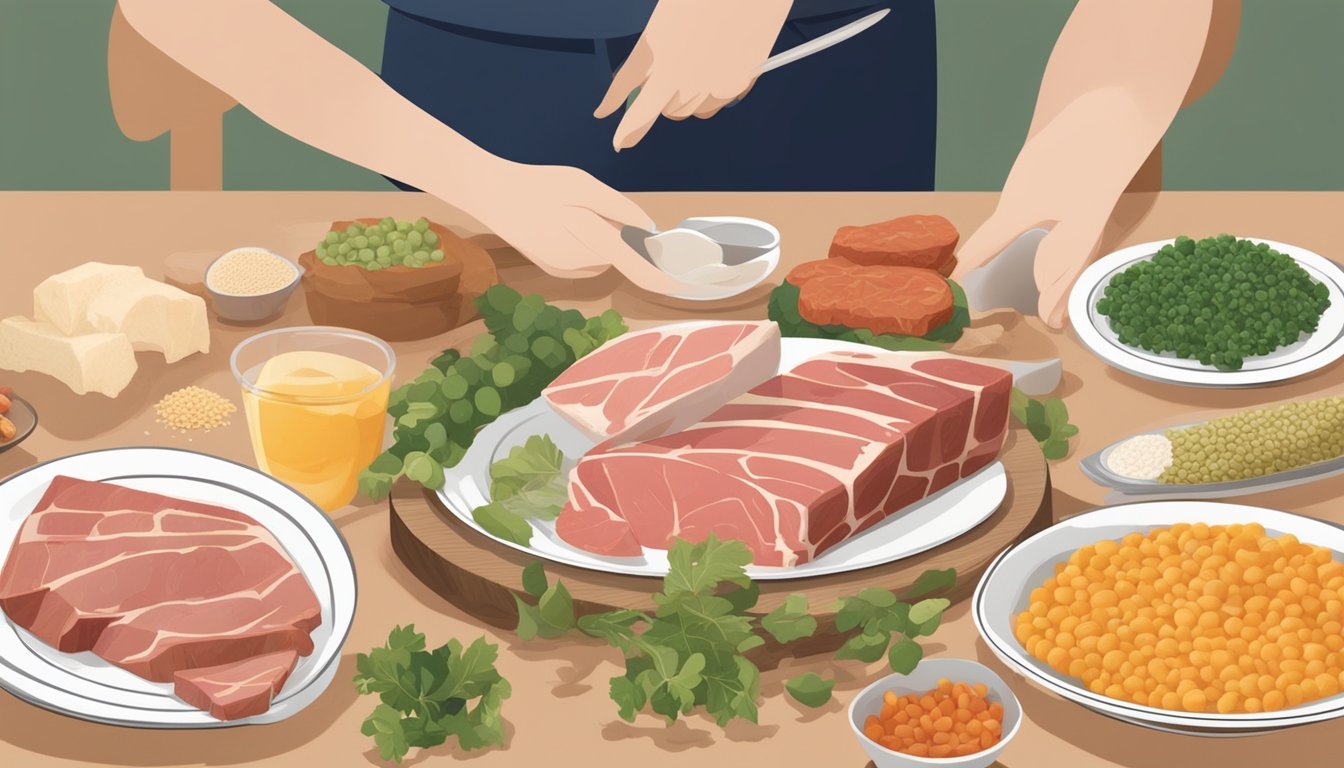Carnivore Diet and Skin Elasticity
Uncovering the Connection
The Carnivore Diet, a regimen focused on consuming exclusively meat, organ meats, and other animal products, has been linked to a variety of health benefits, including those affecting skin health. On the surface, diet influences skin elasticity, a crucial attribute of skin that allows it to return to its original state after being stretched. This property of the skin is fundamental to a youthful appearance, and it is well-known that skin elasticity tends to diminish with age.
Skin health is intricately connected to nutrition. The Carnivore Diet is posited to have an impact on skin health by potentially reducing chronic inflammation, a factor that not only affects overall health but also a variety of autoimmune conditions. Conditions such as psoriasis, which involve the skin, may see improvement through dietary changes that lower inflammation. Critics, however, caution about the potential nutritional deficiencies and long-term health impacts of such a restrictive diet.
While the direct relationship between a carnivore diet and skin elasticity is not heavily documented in scientific literature, anecdotal evidence suggests some individuals experience positive changes in skin condition, including improved firmness and less visible signs of aging. Articulating a definitive conclusion requires further rigorous studies, but exploring the connections between diet and dermatological health remains a focal point for both researchers and those seeking alternative dietary strategies for skin care advancements.
Understanding the Carnivore Diet
The Carnivore Diet focuses on consuming exclusively animal products, positing significant health impacts. It contrasts with plant-based diets and carries both potential benefits and risks, which are crucial for individuals to consider.
Fundamentals of a Carnivore Diet
The Carnivore Diet strictly consists of animal products such as meat, eggs, and organ meats. Fundamentally, it is a high-fat, high-protein diet that excludes all plant-based foods, including vegetables, fruits, legumes, grains, nuts, and seeds. Practitioners of this diet often aim for a state of ketosis, a metabolic state where the body uses fat as the primary source of energy due to the low intake of carbohydrates.
Meat: Including red meat, poultry, and fish.
Eggs: A staple in the diet providing high-quality protein.
Organ Meats: Nutrient-dense items like liver and heart.
Excluded Items:
Vegetables
Fruits
Legumes
Nuts & seeds
Grains
Comparison with Plant-Based Diets
Plant-based diets emphasize consuming fruits, vegetables, legumes, grains, nuts, and seeds. In contrast, the Carnivore Diet eliminates these completely, focusing on animal-based foods. While plant-based diets are rich in fiber and various phytonutrients, the Carnivore Diet provides a different spectrum of nutrients, primarily from protein and fat, and lacks dietary fiber.
Differences:
Fiber: Plant-based diets are high in fiber; the Carnivore Diet has minimal to none.
Carbohydrates: Plant-based diets have a higher carb content compared to the Carnivore Diet, which is low-carb.
Potential Benefits and Risks
Proponents of the Carnivore Diet often report improvements in chronic skin conditions due to its anti-inflammatory properties. It's considered by some to be nutrient-dense, offering high levels of certain vitamins and minerals found in animal products. However, consulting a healthcare professional is recommended due to potential risks such as nutrient deficiencies and increased levels of saturated fat intake.
Benefits:
Health Benefits: Anecdotal evidence suggests improvements in autoimmune and inflammatory conditions.
Risks:
Nutrient Deficiencies: Lack of variety could lead to deficiencies in certain micronutrients not found in animal products.
Saturated Fat: High intake of saturated fat may be a concern for heart health, although this is subject to ongoing debate within the nutrition community.
Carnivore Diet's Impact on Skin Health
The Carnivore Diet, focusing on meat and animal products, emphasizes high intake of certain nutrients critical to skin health, while also potentially reducing skin inflammation and improving chronic skin conditions.
Nutritional Contributions to Skin Health
The Carnivore Diet is rich in several nutrients that are essential for maintaining healthy skin. These include:
Vitamins and Minerals: Vital for skin health, particularly Vitamin A and Vitamin D, which play a role in skin cell reproduction and repair.
Zinc: Acts as an antioxidant and is crucial for collagen production, which helps maintain skin's elasticity.
Fatty Acids: The diet provides omega-3 fatty acids known for their anti-inflammatory properties.
Amino Acids: Essential for the production of collagen and elastin, key proteins in maintaining skin's structure and elasticity.
Role in Inflammation and Acne
The Carnivore Diet's impact on inflammation and acne can be significant due to:
Reduced Inflammation: The elimination of sugar and carbohydrates helps lower blood sugar levels, which can reduce inflammatory responses in the body.
Dairy: By excluding dairy, which is a common trigger for acne, the diet may lead to clearer skin.
Blood Sugar Levels: Stable blood sugar due to low carbohydrate intake may reduce oxidative stress and inflammation, minimizing acne breakouts.
Improvement of Chronic Skin Conditions
People with skin conditions such as psoriasis, eczema, rosacea, and dermatitis may notice improvements due to:
Reduced Inflammation: A lower intake of processed foods and high inflammatory foods like sugar can contribute to reduced skin inflammation.
Antioxidants: Consumption of meat, rich in certain antioxidants, may protect skin cells from oxidative damage.
Collagen Production: A diet high in protein supports collagen production, which can help in restoring skin's integrity in various skin conditions.
Elasticity and Aging
Skin elasticity and the aging process are profoundly connected, as changes in the nutritional intake can impact the production of collagen and other essential proteins that maintain skin's youthful appearance.
Elasticity and Nutrient Intake
Nutrient intake is crucial for maintaining skin elasticity. Collagen, a primary structural protein in skin, relies on sufficient protein intake and important fat-soluble vitamins for its synthesis. These nutrients are integral for supporting the skin's resilience and ability to return to its original state after stretching or contracting.
Proteins: Vital for collagen production and cell turnover, found abundantly in animal-based products.
Fat-soluble vitamins: Include vitamins A, D, E, and K, which are essential for skin health, playing a role in collagen synthesis and protection against skin damage.
Aging Skin and Carnivore Diet
As skin ages, it becomes more prone to wrinkling and sagging due to the natural decrease in collagen production and elasticity. The carnivore diet, which is rich in animal-based products, can be a source of high-quality protein and fat-soluble vitamins that are necessary for collagen synthesis and, consequently, skin elasticity.
Animal-based products: Offer a range of nutrients that support skin health, including omega-3 fatty acids, which can reduce inflammation—a factor in the aging of skin.
Healthcare professional consultation: It is advised for individuals to seek guidance from a healthcare professional before making significant changes to their diet to ensure it meets their specific health needs.
In summary, the carnivore diet possibly contributes to the maintenance of skin elasticity by providing necessary nutrients for collagen production and skin health, which may affect the aging process.
Comparative Diets and Skin Health
In the realm of dietary choices, the impact on skin health is a topic of interest for many. This section examines the effects of different diets on skin conditions, emphasizing the roles of macronutrients, blood sugar levels, and dietary compositions.
Carnivore vs. Keto Diets
The Carnivore and Keto diets share a focus on higher fat and protein intake, but the Carnivore diet exclusively includes animal products. Carnivore Diet proponents suggest that the absence of potentially inflammatory plant substances can enhance skin elasticity and health by reducing chronic inflammation. The diet potentially aids in collagen production, vital for skin firmness. On the other hand, the Keto diet, while also emphasizing fat as the primary macronutrient for energy, does permit low-carb plant intake. The Keto diet's restriction of carbs aims to moderate blood sugar levels, which when spiked, can exacerbate certain skin conditions. Fans of the Keto diet also point to improved skin hydration as a benefit, due to a diet high in healthy fats.
Paleo and Vegan Approaches
The Paleo diet often includes lean meats, fish, fruits, vegetables, nuts, and seeds, avoiding grains, legumes, and dairy. Its focus on whole foods and the elimination of processed foods and sugars can help maintain stable blood sugar, which is vital for preventing skin issues tied to glycemic variability. Contrastingly, Vegan diets eliminate all animal products, including dairy and emphasize whole plant-based foods. Properly planned vegan diets can be rich in vitamins beneficial for the skin, although care must be taken to avoid deficiencies in certain nutrients crucial for skin health, like vitamin B12 and omega-3 fatty acids.
Standard American Diet Effects
The Standard American Diet (SAD), characterized by high intakes of processed foods, refined carbs, and sugars, has been associated with poor skin health. High processed foods and sugary diets can contribute to inflammation and oxidative stress, exacerbating conditions like acne, eczema, and psoriasis. Additionally, such dietary patterns often result in an excess of high-glycemic foods, leading to spikes in blood sugar that can have a deleterious effect on skin collagen, potentially increasing the development of wrinkles and decreasing skin elasticity.
Trigger Foods and Elimination
The relationship between diet and skin health is critical, particularly when considering how certain foods can act as triggers for skin issues. Identifying and eliminating these trigger foods can lead to significant improvements in skin elasticity through the reduction of inflammation.
Identifying Trigger Foods
Trigger foods are substances that can cause adverse reactions in individuals, potentially leading to inflammation and compromising skin health. Common triggers include:
Grains: Often contain gluten, which can be an irritant.
Legumes: May lead to inflammation in sensitive individuals.
Dairy: Lactose can act as an allergen for some people.
Consulting a healthcare professional can aid in recognizing food sensitivities and developing a strategy to determine which foods may be contributing to skin issues. Individual variation plays a considerable role in how one reacts to certain foods.
Benefits of an Elimination Diet
An elimination diet, such as the carnivore diet, involves removing potential irritants and allergens from one's diet to observe changes in health. This diet primarily includes meat, fish, and animal products while excluding plant-based foods. The key benefits are:
Reduced Inflammation: By eliminating foods that cause inflammation, skin health can be improved, and elasticity maintained.
Focused Nutrition: The carnivore diet provides essential nutrients like vitamin B12 and omega-3 fatty acids, which are pivotal for skin repair and health.
It is imperative to approach an elimination diet under the guidance of a healthcare professional to ensure nutritional needs are met and to effectively monitor skin health changes.
Diet's Effect on Gut Health
Understanding the complexity of the human gut and its impact on skin health is essential. Diet plays a crucial role in maintaining gut health, which in turn can influence skin elasticity through the production of collagen and modulation of inflammation.
Gut-Skin Axis
The gut-skin axis refers to the relationship between the gastrointestinal tract and the skin. Collagen production, crucial for skin elasticity, can be affected by gut health due to its role in nutrient absorption. Poor gut health may contribute to increased inflammation, which can degrade collagen and elastin fibers, leading to less elastic skin. Certain skin conditions, such as eczema and psoriasis, have also been linked to gut health imbalances.
Carnivore Diet and Gut Flora
The Carnivore Diet, an elimination diet focusing on animal products, eliminates plant-based foods which provide prebiotics that support the microbiome. This can lead to a change in gut health, affecting beneficial microbiome populations and potentially reducing probiotics in the gut. It is essential to monitor how this diet affects gut health as it may influence skin conditions by altering inflammation and collagen synthesis.
Personalized Approaches to Diet
Successful dietary plans are not one-size-fits-all; they consider unique physiological needs and health objectives.
Tailoring Diet to Individual Needs
When adopting a Carnivore Diet, it's imperative to customize according to an individual's specific requirements. A healthcare professional should be consulted to tailor a carnivore diet that aligns with the person's genetics and ensures hormonal balance. Here are key aspects to consider:
Assessment of Genetics: One's genetic makeup can influence how they respond to the carnivore diet. Genetic testing may offer insights into how diet affects skin health and elasticity.
Consultation with Healthcare Professionals: A healthcare professional can evaluate individual health status, guide dietary adjustments, and monitor outcomes to ensure optimal skin health results.
Regulation of Hormonal Balance: The variety and proportion of foods within the carnivore diet should be adjusted to maintain hormonal balance, which is critical for skin health and overall wellbeing.







